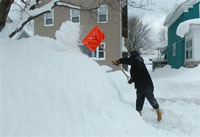American economy's grouth could fall below 1 percent; oil prices down

Oil prices were down Monday because concerns about the U.S. economy overrode expectations of increased fuel demand amid a winter storm pummeling the U.S.
The Weather forecasts do not predict situation to improve. The U.S. National Weather Service on Sunday posted winter storm warnings from Michigan and Indiana all the way to Maine . There was about a foot (30 centimeters) of snow has fallen on parts of the Chicago area, with 10 inches (25 centimeters) in Vermont. Eighteen inches (46 centimeters) was possible in northern New England; more snow was still expected in parts of Michigan.
Many people are living without electricity in part of Oklahoma, Kansas and Missouri. The storm appeared just days after an ice storm, blamed for at least 38 deaths.
Wintry weather led to initially higher oil prices. An energy analyst with Purvin & Gertz in Singapore Victor Shum said that the "storm will stir heating oil use, and these expectations have temporarily overtaken worries about the state of the U.S. economy," he said.
But by afternoon in Europe, light sweet crude for January delivery had shed 85 cents, selling for US$90.42 a barrel in electronic trading on the New York Mercantile Exchange.
Brent crude fell 41 cents, going for US$91.27 a barrel on London's ICE Futures exchange.
Worries about the state of the U.S. economy already affected the market Friday, when the contract fell 98 cents to settle at US$91.27 a barrel after Washington reported inflation jumping in November by the largest amount in more than two years.
Energy traders are concerned that rising inflation will cut consumers' buying power and reduce demand for gasoline and oil. They also worry that higher inflation means the Federal Reserve will stop cutting interest rates. Many analysts cite the Fed's recent rate-cutting campaign, and its role in depressing the value of the dollar, as a major factor behind oil's rise in November to a record above US$99 a barrel.
The movement in oil prices is now being constrained by a split in opinion on the direction that crude futures will take in coming months, Shum said.
"In the near term, pricing should hold relatively stable because we have a stalemate between two camps in the oil market - one camp thinks the U.S. economy will tank next year, possibly go into recession ... and that will hurt crude demand," he said.
"The other camp believes the oil market remains tight and fundamentals will hold up pricing."
Vienna's PVM Oil Associates said oil prices were in for "quite a bumpy ride" with economic concerns dragging them down, even as measures meant to prop up liquidity in global financial markets and data showing reduced U.S. crude oil helped support them.
Many economists believe U.S. economic growth in the current October-December quarter could fall below 1 percent at an annual rate, sharply below growth of 4.9 percent in the third quarter. The U.S. economy is struggling under the weight of a meltdown in housing, a severe credit crunch and faltering consumer confidence.
Heating oil futures slipped marginally to fetch US$2.6061 a gallon (3.8 liters) while gasoline prices lost over a penny, selling for US$2.32 a gallon. Natural gas futures lost 5.5 cents, trading for US$6.970 per 1,000 cubic feet.
Subscribe to Pravda.Ru Telegram channel, Facebook, RSS!


